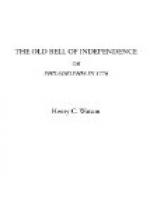INTRODUCTION.
It was a season of unparalleled enthusiasm and rejoicing, when General Lafayette, the friend and supporter of American Independence, responded to the wishes of the people of the United States, and came to see their prosperity, and to hear their expressions of gratitude. The national heart beat joyfully in anticipation; and one long, loud, and free shout of welcome was heard throughout the land.
Arriving at New York in August, 1824, General Lafayette journeyed through the Eastern States, receiving such tokens of affection as the people had extended to no other man except Washington, and then returned southward. On the 28th of September, he entered Philadelphia, the birth-place of the Declaration of Independence, the greater part of the population coming out to receive and welcome him. A large procession was formed, and thirteen triumphal arches erected in the principal streets through which the procession passed.
After General Lafayette himself, the most remarkable objects in the procession were four large open cars, resembling tents, each containing forty veterans of the struggle for independence. No one could, without emotion, behold these winter-locked patriots, whose eyes, dimmed by age, poured forth tears of joy at their unexpected happiness in once more meeting an old commander, and joining in the expressions of gratitude to him.
After passing through the principal streets, General Lafayette was conducted into the hall of the State-House, where the old Continental Congress had assembled, and where the immortal Declaration of Independence was signed. Here the nation’s guest was received formally on behalf of the citizens by the mayor, and then the people were admitted to take him by the hand. At night there was a splendid illumination; and crowds of people traversed the streets, singing and celebrating the exploits of the champion of liberty and the friend of America.
On one of the days succeeding Lafayette’s grand entry into the city, he received, in the Hall of Independence, the veteran soldiers of the Revolution who had come to the city, and those who were residents. One by one these feeble old men came up and took the General by the hand, and to each he had some reminiscence to recall, or some congratulation to offer. Heroes of Brandy wine, Germantown, Trenton, Princeton, Monmouth, and other fields, were there; some with scars to show, and all much suffering to relate. The old patriotic fire was kindled in their breasts, and beamed from their furrowed countenances, as memory flew back to the time that proved their truth and love of liberty. One had been under the command of the fiery Wayne, and shared his dangers with a spirit as dauntless; another had served with the cool and skilful Greene, and loved to recall some exploit in which the Quaker general had displayed his genius; another had followed the lead of Lafayette himself, when a mere youth, at Brandywine: everything conspired to render this interview of the General and the veteran soldiers as touching and as interesting as any recorded by history, or invented by fiction.




